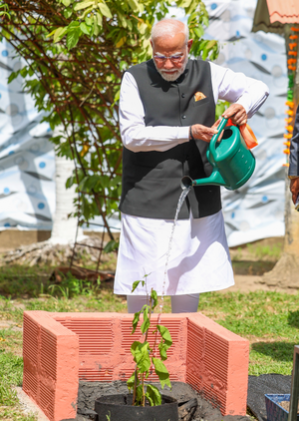
On June 5, 2025, Prime Minister Narendra Modi marked World Environment Day by launching the 'Ek Ped Maa Ke Naam 2.0' initiative. This ambitious campaign aims to plant 10 crore trees across India from June 5 to September 30, 2025. The initiative, which translates to 'A Tree in the Name of Mother,' is a continuation of last year's effort, symbolizing the nurturing power of both nature and motherhood.
The launch event took place at Mahavir Jayanti Park in New Delhi, where PM Modi planted a sapling to inaugurate the campaign. This act not only marked the beginning of the initiative but also celebrated the anniversary of the original 'Ek Ped Maa Ke Naam' campaign, which was launched on the same day the previous year.
In a post on his X handle, PM Modi emphasized the importance of environmental protection, stating, "This #WorldEnvironmentDay, let's deepen our efforts towards protecting our planet and overcoming the challenges we face. I also compliment all those working at the grassroots to make our environment greener and better."
His message underscores the need for collective action in addressing environmental challenges and highlights the role of grassroots efforts in achieving a greener future. The 'Ek Ped Maa Ke Naam 2.0' initiative is not just about planting trees; it is a call to action for individuals and communities to take responsibility for the environment.
#WATCH | Delhi: On World Environment Day, PM Narendra Modi flags off 200 electric buses under Delhi Government's sustainable transport initiative. He also planted a tree under 'Ek Ped Maa Ke Naam' initiative.
— ANI (@ANI) June 5, 2025
Delhi LG VK Saxena, CM Rekha Gupta, Union Minister Bhupendra Yadav and… pic.twitter.com/vbAcBepNXp
By encouraging people to plant trees in honor of their mothers, the campaign fosters a personal connection to environmental conservation, making it a more relatable and impactful endeavor. This approach aligns with the broader goal of promoting sustainable development and increasing forest cover across the nation. India has made significant strides in environmental conservation over the past decade, with efforts leading to a rise in forest cover.
PM Modi highlighted this progress in his message, stating, "It would make you all very happy that in the last decade, India has undertaken numerous collective efforts which have led to increased forest cover across the nation. This is great for our quest towards sustainable development. It is also commendable how local communities have risen to the occasion and taken a lead in this."
India's Commitment to Global Environmental Goals
The initiative aligns with India's commitment to global environmental goals, such as the Paris Agreement, which aims to combat climate change and its impacts. By increasing forest cover, India contributes to carbon sequestration, which is crucial in mitigating the effects of climate change.
The 'Ek Ped Maa Ke Naam 2.0' initiative is a testament to India's dedication to environmental sustainability and its role as a global leader in conservation efforts. The campaign has garnered support from various quarters, including government officials and environmental organizations. Shri Dharmendra Pradhan, a prominent political figure, has urged mass participation in the initiative, emphasizing the importance of collective action in achieving the campaign's ambitious goals. His call to action highlights the need for widespread involvement to ensure the success of the initiative.
On World Environment Day, PM Modi leads India’s green mission.
— DD News (@DDNewslive) June 5, 2025
It's a step towards sustainable living, from planting a Banyan tree under #EkPedMaaKeNaam to launching electric buses.
India is shaping a greener future with the Aravalli Green Wall and bold climate goals.… pic.twitter.com/rVRzCEJnse
The 'Ek Ped Maa Ke Naam 2.0' initiative is part of a broader movement towards environmental consciousness in India. It reflects a growing awareness of the need to protect and preserve the planet for future generations. This movement is not limited to tree planting; it encompasses a range of activities aimed at promoting sustainability and reducing environmental impact.
For instance, the transition to renewable energy sources is a key component of India's environmental strategy. Initiatives like the International Solar Alliance and the Coalition for Disaster Resilience Infrastructure demonstrate India's commitment to sustainable development and climate resilience. These efforts are complemented by policies aimed at reducing carbon emissions and promoting energy efficiency.
In addition to government-led initiatives, grassroots efforts play a crucial role in environmental conservation. Local communities across India have taken the lead in various conservation projects, from river rejuvenation to wildlife protection. These efforts are often driven by individuals and organizations dedicated to preserving the natural environment and promoting sustainable practices.
One such example is the work of women in Jhansi, who have revived the Ghurari river through community-led conservation efforts. By creating check dams and reservoirs, these women have not only addressed water scarcity but also enhanced agricultural productivity in the region. Their efforts exemplify the power of community action in achieving environmental sustainability.

















